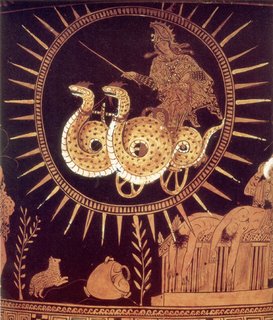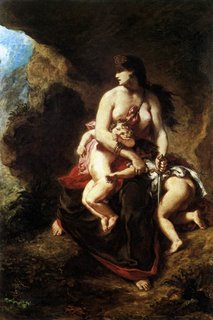As I promised yesterday, I thought I'd write a post on same sex relationships in antiquity, so that
this post on modern homosexual issues wouldn't seem so off-topic. I am not, however, writing an essay on it here. This is just free thought, but I should warn you that it does get a little R-rated.
So as many of you know, we generally know a lot more about male same sex relationships in antiquity than female. Same sex relationships, were generally more acceptable in ancient Greece than in ancient Rome (this is, of course, a gross generalization, as there are periods and cities in ancient Greece where it was not so acceptable, particularly among women).
In Greece, there is the commonly known pederastic relationship among men (an older and a younger male in a mentoring relationship), which seems to be mirrored (from our scanty evidence) for women as well. The Romans looked down on this, but they had their own version of it, which basically consisted of a male in power (i.e. a citizen) penetrating a non-citizen. Any male citizen being penetrated by
anybody was, of course, strictly forbidden (and those who defied this were called
molles mares)--a threat to the masculine identity (
vir) and all.
From this attitude, you can begin to see why so many of the Roman authors just could not
stand the idea of women playing a penetrative role at all (such a woman would be called a
tribas), which is why pretty much the only time you ever see women in same sex relationships is to illustrate how horrible the idea is or to mock. The Romans (well, Martial in particular) also seemed to have the same disconnect that Victorian authors had when discussing Sappho and decided that her relationships were somehow chaste.
The Romans also, very amusingly, had sex so explicitly worked out that they had an intricate set of verbs for each act that is laid out in a wonderful little chart in the beginning of chapter 5 of Craig Williams'
Roman Homosexuality. They amuse me such that I shall reproduce them here (without the chart, since I don't know how to do that on blogger):
Vaginal:
futuere (insertive) and
crisare (receptive)
Anal:
pedicare (insertive) and
cevere (receptive)
Oral:
irrumare (insertive) and
fellare (receptive)
You can see where we get a couple of our English words and, also, where we are clearly lacking in the English language. The Romans clearly understood precision in vocabulary!
I suppose I could write more, but if I go into much more detail, I'll end up writing another paper instead.
Now, the main focus of my writing has been with female relationships, and the sources I studied most closely for this were:
-Sappho's poems, particularly fragments 31 and 94 (and some other smaller fragments as well)
-lyrics of Alkman, contemporary to Sappho (I unfortunately don't have the standard fragment numbers on hand at the moment)
-Xenophon's
Constitution of the Lacedaemonians-Plutarch's
Life of Lycurgus (these two writing about Spartans long after the fact and not in Sparta! So some grains of salt should go along with them)
-Ovid, particularly
Heroides XV (basically having Sappho call female homoerotic relationships shameful) and also in the story of Iphis and Ianthe in his
Metamophoses (in which he shows some sympathy but ultimately has Iphis magically changed into a boy).
-Phaedrus' poem 16 in
Fabulae Aesopiae, which is just a hilarious story about Prometheus coming home drunk and mixing up genitals
-Martial's Epigrams 7.67 and 7.70, dealing with Philaenis, a
tribas whom he makes explicitly distinct from Sappho
These are not exhaustive for female homoerotic relationships in antiquity, but it's a majority of the work at any rate (to my knowledge).
Also, great "secondary sources" to look at include:
-
Among Women: From the Homosocial to the Homoerotic in the Ancient World, edited by Nancy Sorkin Rabinowitz and Lisa Auanger
-
Roman Sexualities, edited by Judith P. Hallett and Marilyn B. Skinner
-
Spartan Women, by Sarah B. Pomeroy
-
Lesbian Desire in the Lyrics of Sappho, by Jane McIntosh Snyder
-
Roman Homosexuality: Ideologies of Masculinity in Classical Antiquity, by Craig A. Williams
-
The Latin Sexual Vocabulary, by J.N. Adams
That, of course, is not an exhaustive list for same sex relationships in antiquity (and it's clearly leaning more towards female relationships), but it's a good start. I've also seen several interesting books pop up on Amazon, but I have yet to read them myself.
Hrm, so now I suppose I've given you all the keys to my pet project. I'd dig up my actual paper on it, but that might bore you all.
Oh, and if anyone gets this far, I do enjoy it when people comment and reply! I sometimes feel like I shooting messages off into space hoping that somebody might hear me . . .
Edited to add: I should probably include a disclaimer that this topic is far more complicated than I've indicated. Some of it I could explain with more time/space, but I'm sure some of it eludes me still. I also wasn't sure how much knowledge to assume, so I assumed quite a bit at times in order to get to the more interesting (mihi) parts.







